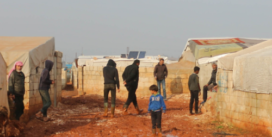- Fall Newsletter, 2025, Issue 15
- Using International Online Learning Modules to Engage Students in the Study of Critical Global Issues
- Upcoming Book Launch: Hearts of Freedom
- Announcing winners of the 2025 CARFMS Essay Contest
- The New York Declaration for Refugees and Migrants and its two Global Compacts: Addressing the Symptoms or the “Root Causes” of Forced Displacement?*
About the 2015 CARFMS Conference
CARFMS15: Advancing Protection And Fostering Belonging In A Global Era Of The Criminalization Of Migration
Hosted by the Department of Criminology, Ryerson University in collaboration with the Ryerson Centre for Immigration and Settlement (RCIS)
The conference will be held at the Ted Rogers School of Management, 55 Dundas St West, Toronto, Ontario, Canada
13-15 May 2015
The United Nations Member States recently acknowledged the need to promote and protect effectively the human rights and fundamental freedoms of all persons, regardless of their migration status. Similarly, there is recognition of the importance of addressing international migration through a comprehensive and balanced approach, recognizing the roles and responsibilities of countries of origin, transit and destination in promoting and protecting the human rights of all migrants (Declaration of the High Level Dialogue on International Migration and Development, 2013). While the international community’s aim to promote a balanced and human-rights-centred approach to migration is laudable, it is also highly challenging to achieve due to the increasing criminalization of migration. Over the past decades, countries of the Global North have resorted to criminal law measures to deter and punish irregular migrants, including those in need of international protection. They have imposed criminal penalties on forced migrants for entering or staying in their territory in an irregular manner, or using false documents or for unauthorized employment. Detention has not only become increasingly common but pervasive. Transport companies and employers as well as other persons who come into contact with or help forced migrants, such as health professionals, humanitarian workers, landlords, family members and friends have also become the targets of criminal sanctions. Asylum systems have become stricter for refugee claimants arriving in the destination countries with the help of smugglers. These developments fuelled by negative political and popular discourses have significant repercussions for the situation of not only forced migrants whose fundamental rights have been constrained, but also for legal migrants who become tainted by suspicion and face ever stronger selection barriers to entry. This practice of criminalization is counterproductive: it may result in rising levels of discrimination against migrants and xenophobia; it may hamper the implementation of integration and settlement policies; it may discourage forced migrants who are the victims of human trafficking, sexual assault, labour exploitation, abuse by employers or domestic violence and other crimes from coming forward, receive adequate protection and denounce the perpetrators of such crimes; ultimately it may contribute to driving forced migration underground, enhancing the possibilities of exploitation, oppression and infringement to their human dignity.
The 2015 CARFMS Conference will bring together students, instructors, researchers, academics, governmental officials, decision-makers, practitioners (including non-governmental organizations), refugee lawyers and members of community organizations, from diverse disciplinary and regional backgrounds to discuss changes, achievements, challenges and short and long-term options for advancing the protection of migrants and fostering their belonging in their receiving societies. The conference will feature keynote and plenary speeches from leaders in the field and from people with direct experience of forced migration.

